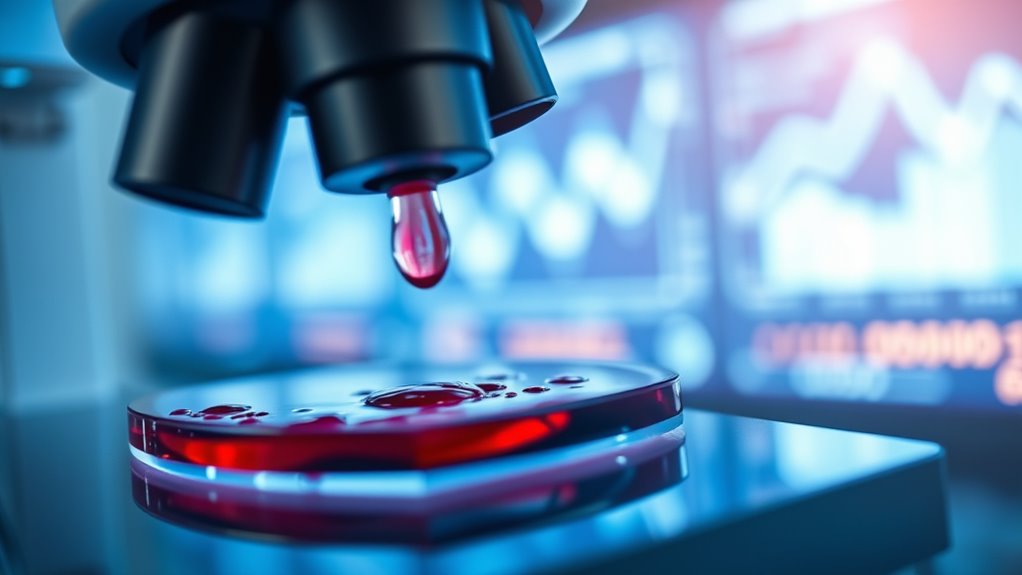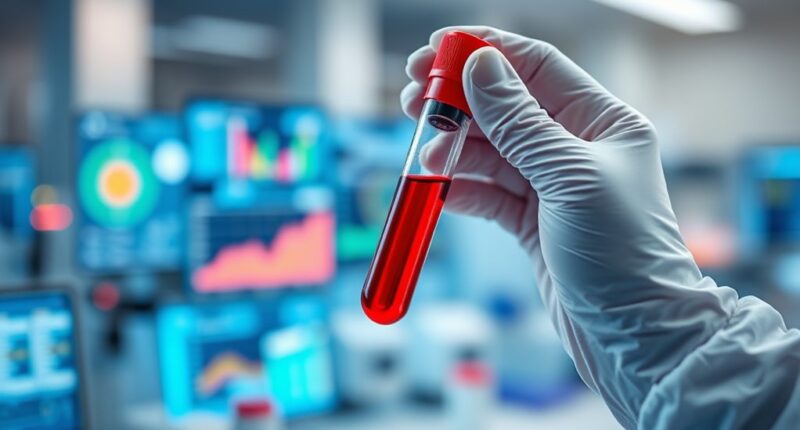Researchers have found that AI blood tests can detect cancer years before symptoms appear, paving the way for earlier treatment and better survival chances. These tests analyze blood markers with advanced AI, identifying subtle signals that traditional methods might miss. While promising, there are still technical, ethical, and regulatory hurdles to overcome for widespread use. To understand how this breakthrough could impact your health, keep exploring what experts are discovering next.
Key Takeaways
- AI blood tests can identify subtle cancer signals years before symptoms appear, enabling earlier diagnosis.
- Recent research shows AI algorithms analyzing blood markers can improve early cancer detection accuracy.
- Progress in AI technology addresses previous challenges like data quality and biological diversity.
- Ethical concerns and validation processes are critical for safe, widespread clinical implementation.
- Ongoing research aims to refine AI blood tests, promising transformative impacts on cancer screening and outcomes.

Advancements in artificial intelligence are paving the way for blood tests that can identify cancer much earlier than current methods. This breakthrough means you might soon receive a simple blood sample that detects cancer years before symptoms appear, potentially saving countless lives through early intervention. However, as promising as this technology is, it also raises important ethical implications and technical challenges that you should be aware of.
One major concern revolves around the ethical implications of using AI in cancer detection. When AI algorithms analyze your blood, they process sensitive health data, raising questions about privacy and data security. Who owns this data? How securely is it stored? If data breaches occur, your personal health information could be exposed, leading to privacy violations. Furthermore, there’s the risk of false positives or negatives. A false positive might cause unnecessary anxiety, invasive procedures, or treatments, while a false negative could delay critical care. Ensuring the accuracy of AI-driven tests is crucial to prevent harm and maintain public trust in this emerging technology.
AI cancer detection raises privacy concerns and risks of false results that could impact trust and safety.
Alongside ethical issues, technical challenges also loom large. Developing AI models capable of reliably detecting early-stage cancer from blood samples demands vast amounts of high-quality data. Gathering such data is complex because early cancer signals are often subtle and difficult to distinguish from benign conditions. Additionally, the AI must be trained to recognize diverse genetic and biological variations across different populations, avoiding biases that could lead to misdiagnoses. Ensuring consistency and accuracy across different laboratories and healthcare settings further complicates matters. These technical hurdles must be overcome before AI blood tests become widespread and trusted in clinical practice.
Furthermore, integrating this technology into existing healthcare systems involves logistical challenges. Healthcare providers need to be trained to interpret AI results correctly, and protocols must be established for follow-up procedures. Regulatory approval processes can also slow down the deployment, as regulators require thorough validation to ensure safety and effectiveness. Despite these hurdles, researchers are making significant progress, working diligently to refine AI algorithms, improve data collection, and address ethical concerns. Addressing these challenges is essential to unlock the full potential of AI blood tests for early cancer detection.
Frequently Asked Questions
How Soon Will AI Blood Tests Be Available Commercially?
You might wonder when AI blood tests will hit the market. While promising, they still face regulatory hurdles and lengthy clinical trials that can take several years. Researchers are actively working to prove their safety and accuracy, but commercialization depends on overcoming these challenges. So, it could be a few years before you see reliable AI blood tests available commercially, giving you earlier cancer detection options.
Are There Any Risks Associated With Ai-Based Cancer Detection?
While AI-based cancer detection offers hope, you should consider the risks. Privacy concerns arise as sensitive data gets analyzed, risking misuse or breaches. False positives can lead to unnecessary stress or treatments. Yet, the promise of earlier detection might outweigh these issues. Stay informed about how developers address these risks, ensuring your health data stays protected and that false alarms are minimized.
Will These Tests Replace Traditional Cancer Screening Methods?
You might wonder if these AI blood tests will replace traditional cancer screenings. While they offer early detection benefits, ethical concerns and data privacy issues remain. These tests could supplement existing methods initially, but replacing them entirely depends on regulatory approval and proven accuracy. You should stay informed about advancements, as AI could revolutionize cancer detection, but it’s essential to address privacy and ethical challenges before full adoption.
How Accurate Are AI Blood Tests Across Different Cancer Types?
You might wonder how accurate AI blood tests are for different cancer types. These tests show promising biomarker accuracy, but detection reliability can vary depending on the cancer. While they excel at identifying certain cancers early, their precision isn’t perfect across all types yet. Ongoing research aims to improve this, so you can expect AI blood tests to become more reliable, yet they should complement—not replace—traditional screening methods for now.
What Is the Cost Comparison Between AI Tests and Current Diagnostics?
You might wonder about the cost comparison between AI blood tests and current diagnostics. A thorough cost analysis shows AI tests could be more affordable long-term due to early detection reducing treatment expenses. Insurance coverage varies, but as AI tests become more mainstream, coverage options should expand, making them more accessible. Overall, investing in AI diagnostics could lower costs and improve early cancer detection, benefiting both patients and healthcare systems.
Conclusion
Imagine a future where detecting cancer early becomes routine thanks to AI blood tests. You might wonder, how much time could this really save? With researchers making strides in identifying cancer years before symptoms appear, it’s clear this technology could revolutionize healthcare. Don’t you want to be part of a world where early detection means more lives saved? The potential is enormous—are you ready to see what AI can do for your health?










